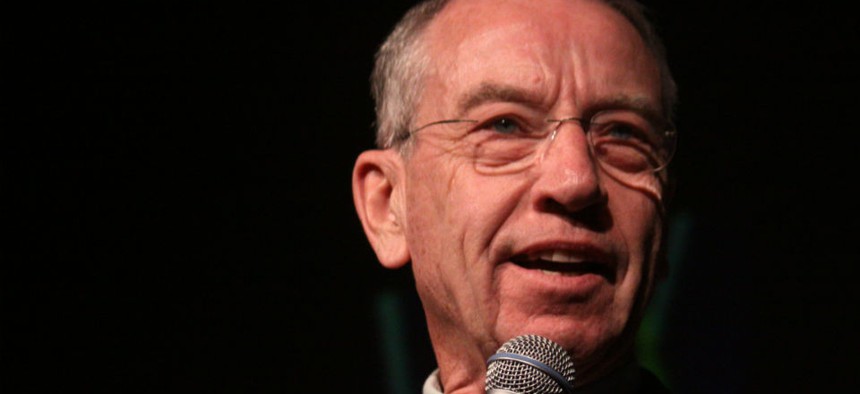
"We've got to do everything we can to carry out what we said during the election," Republican Sen. Chuck Grassley said. Flickr user Gage Skidmore
Senator: Attorney General Confirmation Hearing Will Be Forum to Hit Obama on Immigration
The new Senate Judiciary chairman takes over as his party mulls its next step in executive-order fight with White House.
Chuck Grassley has no reason to believe Loretta Lynch won't be confirmed as the next attorney general. But first, the new Senate Judiciary Committee chairman plans to offer his members an exhaustive, we'll-be-here-all-night-if-we-have-to-style hearing to comb through her record—with a heavy focus on the president's immigration policy.
As Senate Republicans continue to grapple with a response to the executive actions on immigration taken by President Obama—whom Grassley likens to King George III—members will get their first opportunity to go on record venting their frustrations and grill the administration on the issue next Wednesday, when Obama's Justice Department pick gets her moment before the committee.
Currently, Republican senators are mired in debate over how to stop the administration from moving forward on changes to the nation's immigration policy that the party has repeatedly called "illegal" and "unconstitutional"—all while preventing a shutdown of the Department of Homeland Security at the end of February. The House sent over a bill last week that the Senate is expected to take up in the near future, but few believe it will pass the upper chamber.
That has conservatives concerned that their leadership will cave, sending a clean funding bill back to the House and allowing Obama to move forward on immigration with nothing but a rhetorical slap on the wrist from Republicans. So far, Senate Majority Leader Mitch McConnell has been silent on the issue.
Grassley, whose committee will have a major influence on any immigration debate in Congress this year, said that if they cannot pass the House bill, Republicans in both chambers will need to use every weapon in their constitutional arsenal to respond to the president's immigration action.
"We've got to do everything we can to carry out what we said during the election," Grassley said during a wide-ranging interview in his office Wednesday morning. "We said that he's acting in an unconstitutional and/or illegal way."
For Grassley, the Lynch nomination will be the first of many tests of his chairmanship. The farmer from Iowa is the first nonlawyer to head the Judiciary Committee, an honor that he feels gives him a unique perspective on the panel's issues and makes him a little more relatable to the average American than some of the legal scholars of the past.
The stakes are high, Grassley said. "You ought to remember why the Declaration of Independence was written. ... It was that we didn't want one person telling the 13 colonies what to do," Grassley said. "We've got a divided government between judicial, executive, and legislative, and you can't let President Obama be a George III. And that's what he's doing through executive orders."
With no direction yet from Senate leadership and deep uncertainty about the House bill's prospects for passage, many members will be left with the Lynch hearing as their best opportunity to take the president to task on immigration.
Grassley predicted Wednesday that it would be a focal point of questioning by his fellow Republican members. The 81-year-old senator said he will allow members to grill Lynch until they run out of questions. "It's going to go on as long as it takes to get it done. But I hope it doesn't take more than one day," he said.
Despite member concerns over immigration, Lynch is widely expected to be confirmed by both the Judiciary Committee and the full Senate as soon as next month. Lynch has already been approved by the Senate twice for her two stints as U.S. attorney and has been subject to previous congressional scrutiny, including by Grassley, who has served on the panel for more than three decades.
Grassley did not want to get ahead of his fellow committee members in predicting that Lynch would pass through his committee, but he did discuss timing for a full Senate vote, which could come as early as February.
As far as Lynch's background goes, Grassley said that he doesn't expect any "big surprises."
"It's going to be more, how does she respond to her administrative abilities and her policies and whether or not she's going to be political or not political. You know, the things we find fault with [outgoing Attorney General Eric] Holder," Grassley said.
But that doesn't mean Lynch will fully satisfy Republican demands, Grassley noted. One of the frustrations of interviewing these nominees for decades is that you never really know what you're going to end up getting, he said.
And so when Lynch sat down in his office last month, Grassley told her the same thing he told Health and Human Services Secretary Sylvia Mathews Burwell before her confirmation last year. "I said: 'You know, all of you people, for 30 years you come up here and you always answer our questions very positively, whether we've got Republicans or Democrats, that you're going to help us with our oversight and answer our letters and all that, and you all say yes, but it doesn't work out that way,'" said Grassley, a prolific writer of letters to executive branch officials. "So I said to the secretary of HHS and I said to [Lynch], 'Maybe you ought to be more honest and just say maybe.'"
As for his own questions, Grassley hopes to get Lynch to promise greater transparency from the Justice Department than her predecessor has provided. As he has asked Holder numerous times, Grassley would like to get Lynch to commit to publicizing the White House legal counsel's opinions on whether the president's executive actions and memoranda—like the immigration order—are constitutional.
First and foremost, Grassley's chairmanship will be focused on oversight. "Which is something that I think would be relatively new for the committee," he said. In contrast to past panels, Grassley hopes to lead his Judiciary Committee in a more active investigative capacity, rather than merely responding to reports of federal misconduct after the fact. "I'm talking about the oversight where we initiate it and it's ongoing, and it's not just an appearance," he said.
On the policy front, Grassley plans to start with legislation that could receive bipartisan backing, including cybersecurity reforms pushed by the president in his State of the Union address; a patent-reform compromise that was nearly achieved by Sens. John Cornyn and Chuck Schumer last year; and juvenile justice reform, which has been pushed by senators as diverse as Pennsylvania's Robert Casey and Rand Paul of Kentucky.
Grassley would also like to see action on a grant-reform proposal he floated several years that went nowhere in the Senate, as well as immigration. But on the latter issue, Grassley is taking a backseat approach. "We worked on it so hard two years ago. Let the House see what they're going to do, so we don't waste our time if they're not going to do anything," he said. "But I believe that they are going to do something."
By the end of the year, Grassley said he also hopes to push through a balanced-budget amendment to the Senate floor, something the upper chamber hasn't seen "since the '90s," he said.
As for future nominees, Grassley said he doesn't plan to make many changes to the way things have operated on the Judiciary Committee in recent years. Perhaps the biggest question hanging over his chairmanship is whether the new Senate majority will reverse now-Minority Leader Harry Reid's use of the nuclear option for judicial nominees.
The Republican conference as a whole remains undecided on the issue, but for Grassley—one of the staunchest opponents to Reid's move—what's good for the goose is good for the gander. The senator is "leaning towards" keeping the 51-vote threshold in place, a spokeswoman confirmed in an email.
Asked how he would consider future judicial nominees, Grassley said that he would hold to the Senate tradition of seeking approval from a nominee's home-state senators (in letters known as "blue slips").
"Beyond that," he said, "I look at intellect, judicial temperament, how they interpret the Constitution, preferring strict constructionists, you know. That doesn't mean that you vote against people who don't fall into that pattern, but that's what I appreciate.… Not legislate from the branch, follow stare decisis. Pretty much that's how I've been looking at judges for a long period of time."
Grassley's chairmanship of the powerful Judiciary Committee could give him an additional spotlight, and potentially additional scrutiny, as he prepares for reelection in 2016. Luckily for Grassley, his state just elected conservative Sen. Joni Ernst, and the senior senator is low on the totem pole of Democratic targets this cycle, with purple-state Republicans in Illinois, New Hampshire, Pennsylvania, and Wisconsin providing much richer targets. But, Grassley said, that hasn't stopped Democrats from tracking him for "two or three years" now.
"They have more footage of me—I just hope they don't have a strong candidate against me and I won't have to worry about it," he joked. "But if they do, I've got a lot to worry about."
(Image via Flickr user Gage Skidmore)







